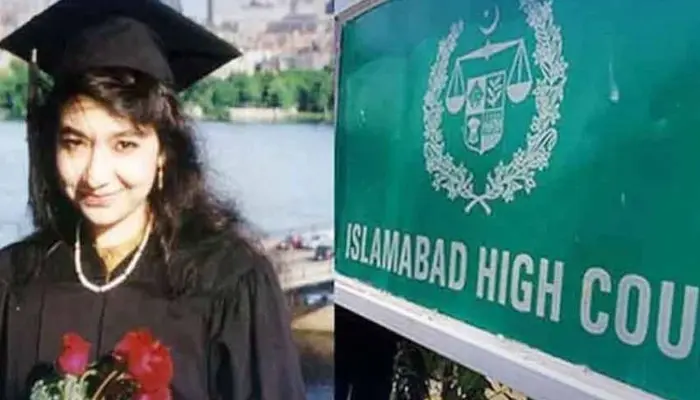The Islamabad High Court (IHC) is reviewing the government’s efforts to secure the repatriation of Dr. Aafia Siddiqui, a Pakistani neuroscientist imprisoned in the United States. During a hearing on Friday, the federal government informed the court that a proposed prisoner exchange involving Shakeel Afridi, a Pakistani doctor convicted of espionage, is not legally or diplomatically feasible.
Government Rejects Prisoner Swap Proposal
Additional Attorney General (AAG) Munawar Iqbal Duggal stated that Pakistan and the U.S. do not have an agreement for prisoner exchanges. He clarified that since both Aafia Siddiqui and Shakeel Afridi are Pakistani citizens, an exchange is not legally viable.
The AAG also revealed that the government has concerns regarding a petition filed by Aafia Siddiqui’s legal team in U.S. courts. In response, the IHC directed him to consult with government officials and submit a detailed report by next Friday.
Why Is Shakeel Afridi Important to the U.S.?
Justice Sardar Ijaz Ishaq Khan questioned why Shakeel Afridi holds significance for the U.S. Amicus curiae Zainab Janjua explained that Afridi was convicted in Pakistan, and his appeal remains pending in the Peshawar High Court. Dr. Fauzia Siddiqui’s lawyer, Imran Shafiq, added that Afridi is accused of collaborating with foreign intelligence agencies, particularly in tracking Osama bin Laden.
Afridi allegedly ran a fake vaccination campaign to help the CIA locate bin Laden before the 2011 U.S. operation in Abbottabad. This involvement has made him a crucial figure in U.S.-Pakistan relations.
Read: Karachi Customs Seizes Rs. 100 Million in Smuggled Electronics in Raid
U.S. Response and Diplomatic Concerns
The AAG informed the court that Pakistan had submitted a response on February 19. He further disclosed that former U.S. President Joe Biden rejected Aafia Siddiqui’s plea for clemency. Additionally, the U.S. government has not responded to a letter from Pakistan’s prime minister requesting her release.
Justice Khan expressed concern over Pakistan’s diplomatic approach. He criticized the lack of engagement from the White House and questioned the government’s reluctance to fully support the petition in U.S. courts.
Legal and Diplomatic Challenges
Aafia Siddiqui’s American lawyer, Clive Smith, initially suggested the prisoner swap as a possible solution. However, the government’s rejection of this proposal has complicated efforts to bring her back to Pakistan.
The IHC has adjourned the hearing until next Friday. The court has instructed the AAG to provide a comprehensive response outlining the government’s objections to the U.S. court petition. It has also asked for clarification on the diplomatic steps Pakistan has taken to advocate for Aafia Siddiqui’s release.
A Case That Continues to Shape U.S.-Pakistan Relations
Dr. Aafia Siddiqui is serving an 86-year prison sentence in the U.S. for allegedly attempting to kill American soldiers in Afghanistan. Her case has remained a point of contention between Pakistan and the U.S., with ongoing legal and diplomatic battles. Meanwhile, Shakeel Afridi, imprisoned in Pakistan, remains a key figure in negotiations between the two countries.
The court’s upcoming decision and the government’s next steps will determine whether any progress can be made in securing Aafia Siddiqui’s return to Pakistan.
Follow us on Google News, Instagram, YouTube, Facebook,Whats App, and TikTok for latest updates
